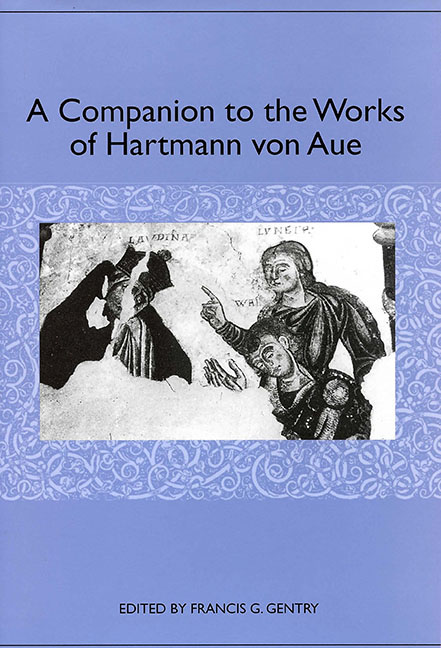Book contents
- Frontmatter
- Contents
- Acknowledgments
- Introduction
- Hartmann's Theological Milieu
- Hartmann von Aue as Lyricist
- Hartmann von Aue and Chrétien de Troyes: Respective Approaches to the Matter of Britain
- Gender and Love in the Epic Romances of Hartmann von Aue
- The Two-Fold Path: Erec and Enite on the Road to Wisdom
- The Body in Pain in the Works of Hartmann von Aue
- Illness and Cure in Hartmann von Aue's Arme Heinrich and Iwein
- Hartmann's Legends and the Bible
- Hartmann's Works in the Visual Arts
- The Medieval Literary Reception of Hartmann's Works
- A Tale of Sacrifice and Love: Literary Way Stations of the Arme Heinrich from the Brothers Grimm to Tankred Dorst
- Editions and Translations of Hartmann's Works
- Works Cited
- Notes on the Contributors
- Index
Hartmann's Theological Milieu
Published online by Cambridge University Press: 27 April 2017
- Frontmatter
- Contents
- Acknowledgments
- Introduction
- Hartmann's Theological Milieu
- Hartmann von Aue as Lyricist
- Hartmann von Aue and Chrétien de Troyes: Respective Approaches to the Matter of Britain
- Gender and Love in the Epic Romances of Hartmann von Aue
- The Two-Fold Path: Erec and Enite on the Road to Wisdom
- The Body in Pain in the Works of Hartmann von Aue
- Illness and Cure in Hartmann von Aue's Arme Heinrich and Iwein
- Hartmann's Legends and the Bible
- Hartmann's Works in the Visual Arts
- The Medieval Literary Reception of Hartmann's Works
- A Tale of Sacrifice and Love: Literary Way Stations of the Arme Heinrich from the Brothers Grimm to Tankred Dorst
- Editions and Translations of Hartmann's Works
- Works Cited
- Notes on the Contributors
- Index
Summary
Hartmann, certainly in his narrative works, is a poet possessing such talent and treating themes of such universal appeal that an interested and discerning present-day reader can enjoy and profit from his writing without having to resort to studies dealing with his times and cultural environment. This bears eloquent testimony to his literary stature. Nevertheless, some information about the issues that concerned him and his thoughtful contemporaries can deepen and clarify one's understanding of his works. Often these were religious or theological issues. One finds them to some extent in all of Hartmann's writings, even when he paints for us the secular and self-contained world of Arthur, with its knightly quests and lovely ladies, as in Erec or Iwein; or when he describes courtly love and what it demands of courtly knights seeking it, as in his youthful diu Klage (Lament) and much of his lyric poetry. His two shorter narratives, Gregorius and Der arme Heinrich, are religious or theological to the core. Although he demonstrates substantial knowledge of theology, Hartmann mentions no specific sources for the religious thought in his works. We must therefore examine these as to their theological content to determine more precisely what currents of theology we find to be influencing him and what issues concern him.
One finds little in Hartmann's works that points to the influence of scholasticism, that new and more systematic approach to theology emanating chiefly from Paris. Similarly, vernacular theology — religious thought from the milieu of pious women and their confessors or from movements, largely among the laity, both orthodox and heretical — was at best in its infancy. What one finds at the foundation of his religious thinking is what one should expect to find: the theology originating largely in the monasteries, from there spreading among the clergy at large, and from them, through sermons and instruction, to the laity. In this tradition, the great Father of the Church, Augustine of Hippo (354–430) stands out as the overwhelmingly dominant figure determining for Christians in the West how they are to understand who God is, who they are, and what their relationship to God implies.
- Type
- Chapter
- Information
- A Companion to the Works of Hartmann von Aue , pp. 9 - 20Publisher: Boydell & BrewerPrint publication year: 2004



